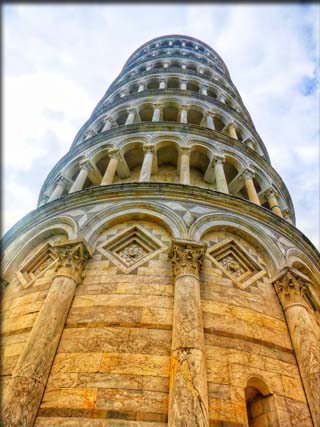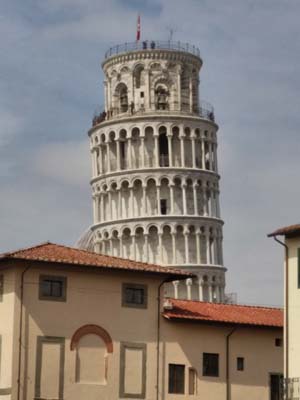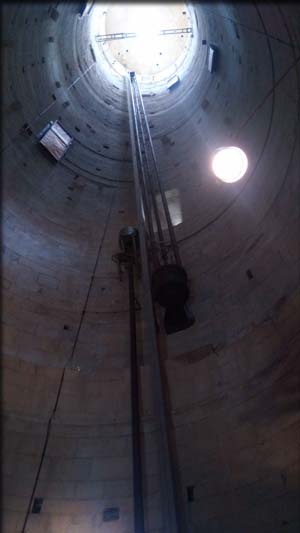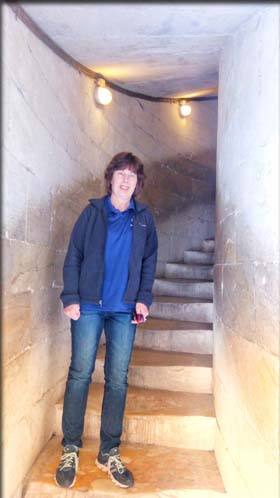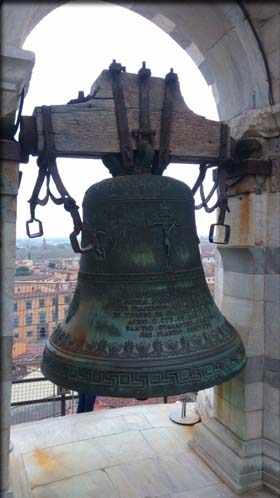pop up description layer
HOME
Cryptozoology UFO Mysteries Aviation Space & Time Dinosaurs Geology Archaeology Exploration 7 Wonders Surprising Science Troubled History Library Laboratory Attic Theater Store Index/Site Map Cyclorama
Search the Site: |
|
Notes from the Curator's Office - A Climb Up the Leaning Tower of Pisa The Leaning Tower of Pisa is one of those iconic structures that everyone knows from the time they are a child. A pilgrimage to visit it gave me a chance to see it with my own eyes, touch with my own hands and interact with something I had known in my mind for decades, but didn't really know in reality. Planning a trip across Italy in 2018 my wife and I listed the sights we wanted to see: Pompeii, the Coliseum, St Mark's square in Venice, but should the Pisa be on the list too? While Rome with its myriad, ruins and Venice with its architecture and canals were no brainers, did Pisa with its single iconic bell tower warrant a stop? In the end we decided to sandwich an afternoon there during our train ride from Rome to Venice. Now to tell you the truth Pisa is not exactly on the way from Rome to Venice, but we decided, in the end, that this pretty Tuscan city deserved a stop on our crowded tour.
Our day trip to Pisa was typical of how most tourists see the city, though the majority of people probably come from Florence which is only an hour or so away. Wherever you come from, however, you are most likely to enter the city via the Pisa Central station, a twenty minute walk from the tower. Our train got in at 10AM. Unlike day visitors from Florence, we had luggage that we didn't want to haul with us through the town. Fortunately, most larger train stations in Italy have a counter to deposit luggage and Pisa was no exception, though at 6 Euros a bag, it wasn't cheap. Given that the famed bell tower and its associated "Field of Miracles'" is the main attraction in the town, it isn't surprising that the streets between the station and the field are lined with shops and restaurants, making it hard to get off track. Halfway to the tower you need to cross the Arno River and there are only a handful of bridges that cross it. The Arno, which runs through the center of the town. Despite its height, the narrow streets of the town lined with buildings several stories high, tend to hide the monument until you are almost on it, but once you see the white, marble structure, with its classic columns, peering down on you over the roof tops, you have no doubt you're at the right place.
There are five attractions at Pisa's "Field of Miracles:" The famed tower, the associated cathedral, a baptistery, the cemetery (Camposanto) and the Sinopie Museum. You can buy a combination ticket for all five for 26 euros (about $30), but we opted for the just the tower at 18 euros (about $21). The cathedral is actually free, but you still need to get ticket for entry at a specific time so the building doesn't get overcrowded. Our tower ticket, however, allowed us to access it at any time during the day. We arrived in Pisa about 10 o'clock and by 11 where walking though the large Romanesque cathedral. Designed by the architect Buscheto, it clearly matches the style of the tower and Baptistery. Construction started in 1063 and took nearly 30 years. We couldn't spend an excessive amount of time inside, however, as we had tickets to climb the tower at 11:30. As one might expect with a world famous icon like the leaning tower, access is limited and only so many people get to climb the off-kilter structure in a single day. This isn't surprising as the top can only be reached by a narrow, winding stairway that will only accommodate a limited number of people. The official website states that ticket holder needs to be at the entrance on time, or they will lose their opportunity to make the climb.
For security reasons nothing larger than a wallet is permitted to be brought inside the building, but fortunately the ticket also provides you access to the tower's bag check at a nearby building. Once our turn had arrived we were allowed through the gate and into the single door at the base of the structure. And here was my first surprise: The tower itself is simply an empty cylinder. You can stand at the bottom and look up straight up to the top (which is the floor of the level below the belfry) and it's filled with pretty much nothing but empty space. The floors you see from the outside, suggested by the arrangement of columns, do not extend into the interior at all. The steps to the top are contained within the outer walls of the tower and spiral around as they climb. The famous tilt of the tower is obvious from the inside as a mechanical device that appears to be used to move the bells up and down if they need to be serviced, goes straight up and down, while the tower itself is on a nearly 4 degree slant. As you climb the tower you almost have a the feeling you are in a fun house as the walls first tilt one way, then the other as you round the structure. Positioned at regular intervals are windows that allow the visitor to get a glimpse outside. Because there is a small platform at that point, these locations make a good place to stop and grab a breath, letting younger and more energetic visitors pass you on the way up, or let people headed down, slip by you.
At the top you come out just below the belfry. A second, but more tightly twisted staircase takes you the final 10 feet or so to the belfry itself, which is open to the sky. There seven bells (each sounding with a different pitch on the musical scale) hang. With the exception of the roof of the cathedral, at 191 feet (55m) the tower is the tallest building in the town, so it gives you a magnificent view of the surrounding area. There is a debate among travelers on whether the small town of Pisa is worth an afternoon stop in a land filled with such cities filled with art and architecture as the Rome and Venice, but I found he afternoon there we spent in the Tuscan city well worth our time and now I can now I can check off one more item on my bucket list. For a more detailed look at the history of the Leaning Tower, click here. Copyright Lee Krystek 2018. All Rights Reserved. |
|
Related Links |
|
|



